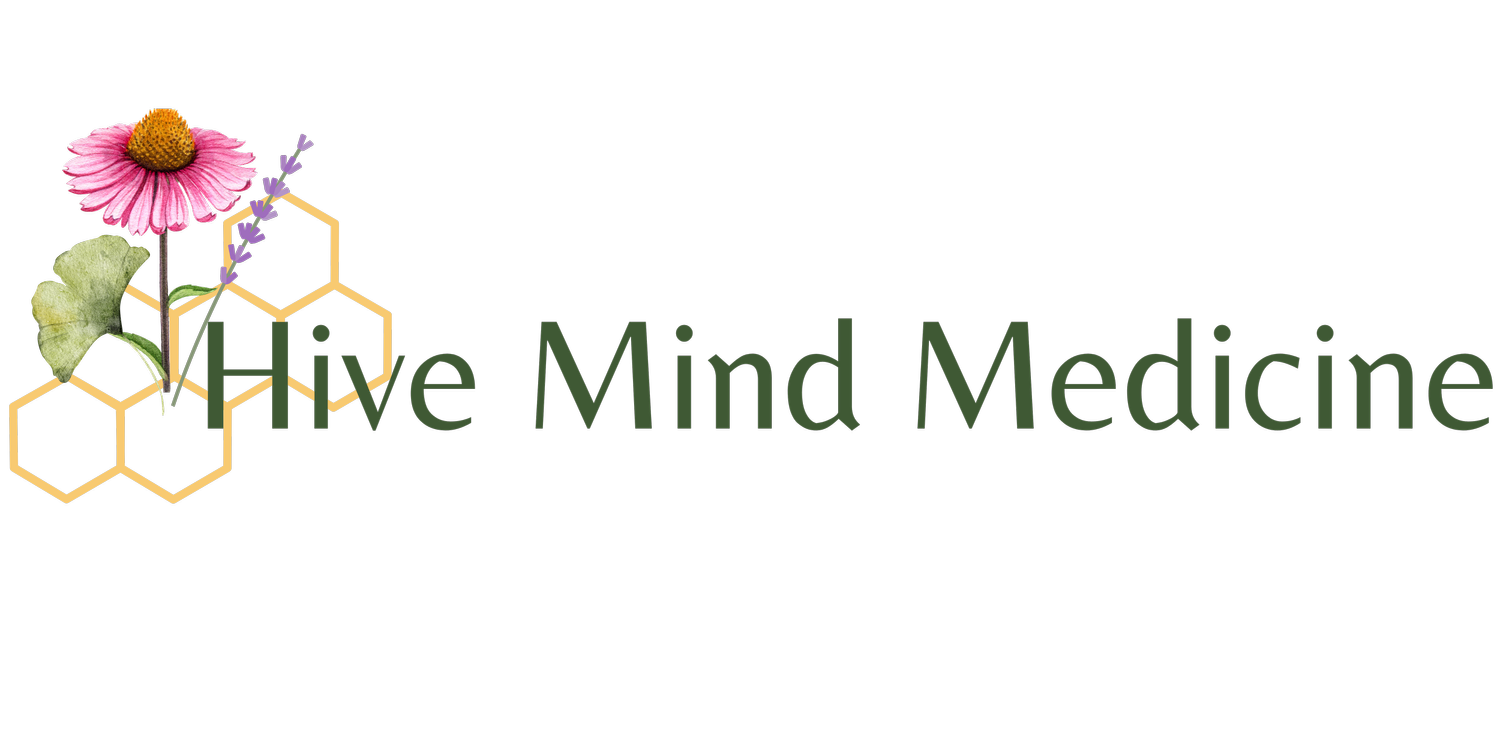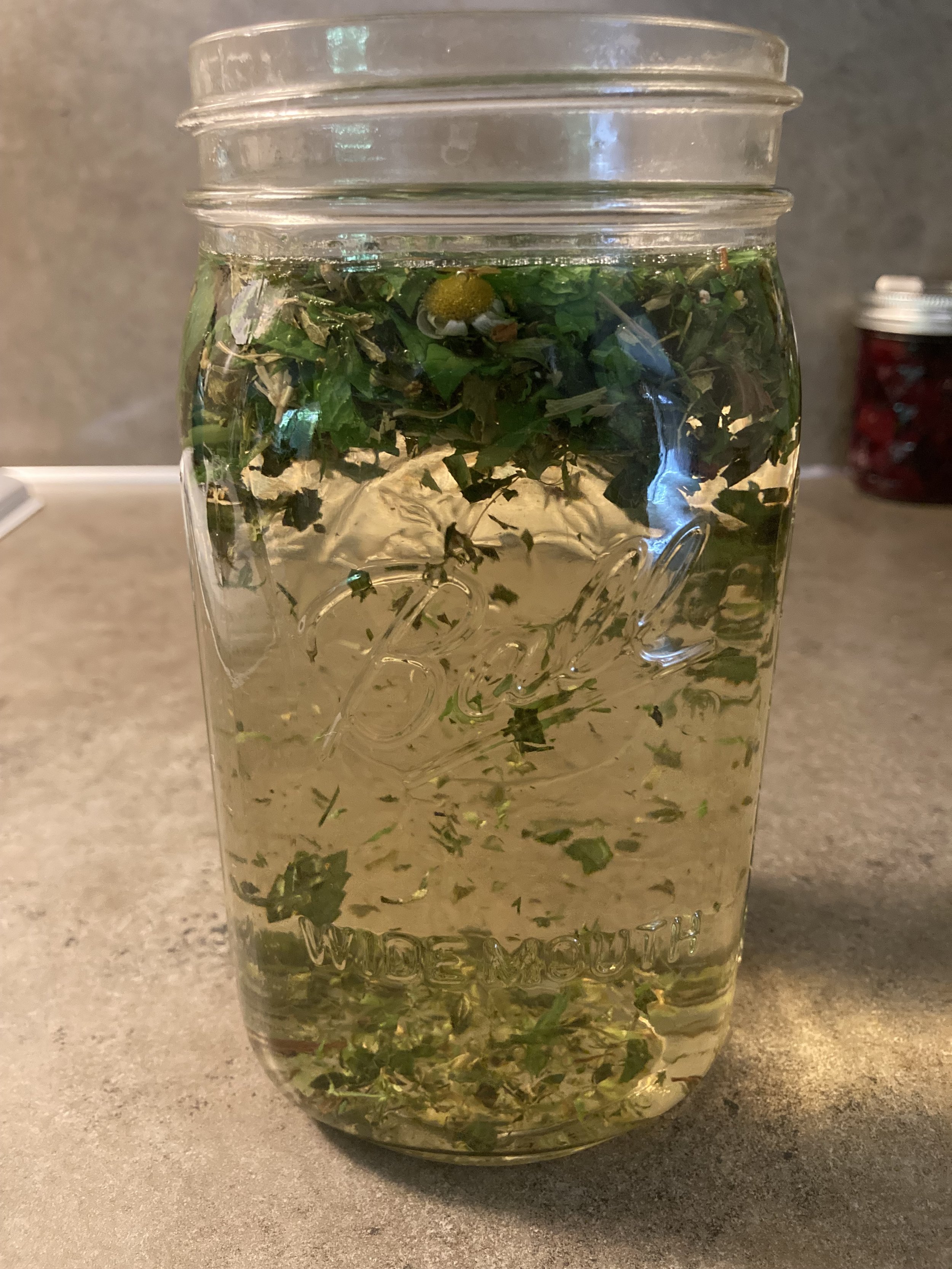Anti-Inflammatory Tea: Feverfew Infusion
by Anne Kessler, MScN
Feverfew
Feverfew is a flowering perennial herb with edible leaves and bright white flowers that at a glance looks similar to chamomile. It possesses a lightly bitter flavor with floral notes and is often consumed as a tea or tincture. Traditionally, feverfew was used to treat a variety of inflammatory conditions including fever and arthritis. We now know that feverfew inhibits IL-1, which is an inflammatory cell signaling molecule that also promotes fever in the body. Research has also found that feverfew inhibits IL-1 production in the cells of joint capsules, which may support feverfew’s traditional use for arthritis.
Feverfew’s most well researched constituent is parthenolide, which possesses anti-inflammatory effects and has been shown to inhibit NF-kb. For those who might need a quick a refresher, NF-kb signals our cells at the DNA level to make pro-inflammatory compounds. It plays an important role in our overall health and immune function, but too much NF-kb can be a problem.
Feverfew & Migraines
Feverfew has been studied at length for its beneficial effects on migraine headaches. The leaf of the plant may actually be more beneficial than the flower for helping to address migraines, so if you enjoy growing feverfew like I do, make sure you are harvesting the leaves and not just the flowers. Research indicates that feverfew is best used prophylactically to prevent migraines, but that individuals may need to consume feverfew for 4-6 weeks before they notice any changes in symptoms. Feverfew is generally less effective at addressing migraines once an attack has begun. In a blind randomized controlled trial of adults with a history of migraine who had been taking feverfew to address their migraine symptoms, patients were assigned either to a placebo or to a freeze dried feverfew supplement. Patients who took the feverfew continued to enjoy reduced frequency of their migraines while those in the placebo group experienced an increase in frequency and severity of headache, nausea, and vomiting.
Feverfew and Allergic Symptoms
In addition, feverfew possesses strong antiallergy effects. It acts as a mast cell stabilizer, it inhibits histamine release, and it reduces platelet aggregation. As a result, feverfew has been shown to be beneficial in conditions that have an allergic origin such as eczema and other skin eruptions, asthma, hay fever, migraines, interstitial cystitis, enuresis, IBS, allergic diarrhea, food allergies, and food sensitivities. Individuals who experience these types of allergic reactions may have more pronounced digestive symptoms.
Additional Safety Notes
Feverfew is contraindicated in pregnancy. Individuals who stop taking feverfew after consistent long-term use may develop “post-feverfew syndrome” with symptoms of headaches, insomnia, anxiety, and muscle and joint stiffness.
Anti-inflammatory Tea Infusion
I love this tea for when there are other inflammatory symptoms accompanying digestive issues. Not only is feverfew excellent at inhibiting IL-1 and NFkb but lemon balm is also excellent at reducing inflammatory signaling molecule IL-6 that may be elevated when inflammation is accompanied by symptoms of anxiety. The spearmint and stevia do an excellent job of making the bitter feverfew more palatable.
Ingredients:
1Tbs dried feverfew
3Tbs fresh spearmint
1 Tbs fresh lemon balm
1tsp dried stevia leaves
Instructions:
1. Combine all ingredients in a 1-quart mason jar
2. Fill with boiling water and immediately seal
3. Once the jar is cool to the touch, move to the refrigerator to chill
4. Enjoy chilled within ~3 days’ time.
References
1. Godfrey A, Paul Richard Saunders. Principles & Practices of Naturopathic Botanical Medicine. Canadian College of Naturopathic Medicine Press; 2010.
2. Bone K, Mills S. Principles and Practice of Phytotherapy Modern Herbal Medicine. 2nd ed. Edinburgh Churchill Livingstone, Elsevier; 2013.
3. Tilgner S. Herbal Medicine: From the Heart of the Earth. Wise Acres; 2009.
4. Hoffmann D. Medical Herbalism - Principles and Practices. Inner Traditions Bear And Comp; 2003
5. Stansbury J. Herbal Formularies for Health Professionals Volume 1: Digestion and Elimination, Including the Gastrointestinal System, Liver and Gallbladder, Urinary System, and the Skin. White River Junction, Vermont Chelsea Green Publishing; 2018.
Anne Kessler specializes in providing holistic nutrition therapy for individuals with a wide variety of gastrointestinal conditions including IBS, SIBO, candida overgrowth, SIFO, GERD, IBD, diverticulosis, Celiac Disease, histamine intolerance and MCAS, as well as food allergies, sensitivities, and intolerances.
Anne earned a Master of Science in Nutrition from the National University of Natural Medicine and is presently a candidate for board certification as a Certified Nutrition Specialist. During her training at NUNM, she interned on Clinical Nutrition Shifts with Dulcie Childs, RD, and the GI Mentor Shift with Dr. Steven Sandberg-Lewis. She is certified through the Food as Medicine Institute as a Food as Medicine Everyday Educator.
Hive Mind Medicine blog posts are for educational purposes only and are not intended as medical advice. Please consult with your health care practitioner for personalized guidance.

